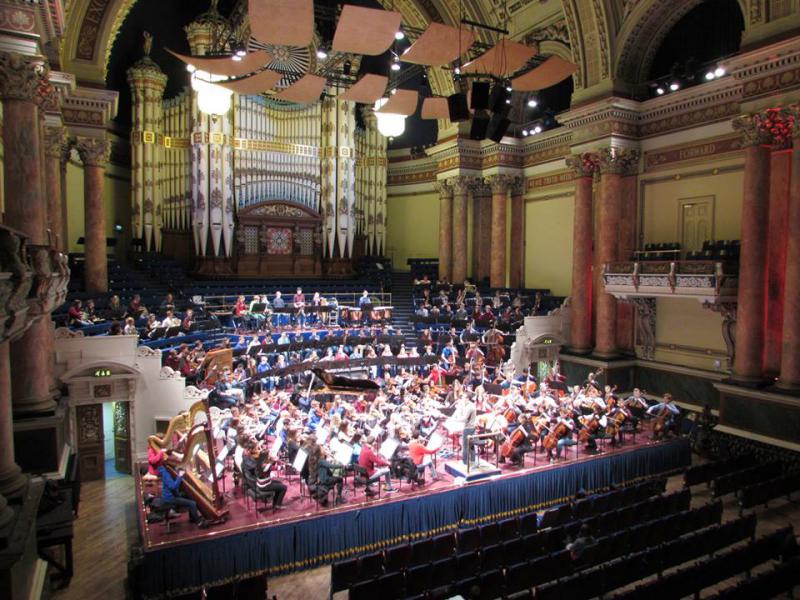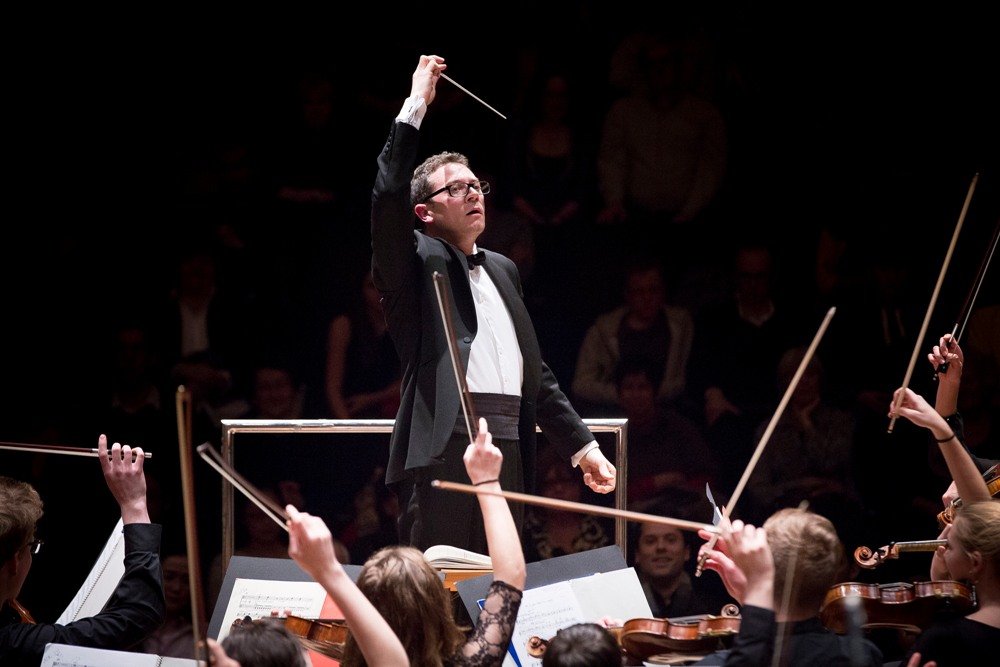Elgar. Hmm. Music for the home counties. Party conferences. Golf clubs, and chaps wearing tweed jackets. All wrong, of course; it’s easy to forget that this most misunderstood of composers was actually a bit of an outsider. A self-taught, working-class Catholic, he definitely wasn’t a member of the establishment.
Elgar’s First Symphony isn’t music for crusty old buffers, and John Wilson’s coruscating performance with the National Youth Orchestra of Great Britain served to highlight its many wonders. Despite the vast forces assembled, has Elgar’s scoring ever sounded so transparent? Or, dare I say it, European? All that intricate, divisi string writing, projected here with glorious assurance. And this composer’s habit of sharing a tune between different instrumental voices – the symphony’s elusive motto theme pinging across the packed stage from muted horns to lower brass
 This piece needs a firm hand, and Wilson’s no-nonsense conducting style invoked playing of stylish, stunning accuracy. The Allegro molto’s scampering violin lines were ideally clear, and I’ve rarely heard the magical transition to the Adagio handled with such aplomb. Wilson even succeeded in knitting together the finale’s disparate elements; the movement’s sequential doodlings never outstaying their welcome. Glorious stuff, the playing beyond reproach – it seems invidious to single out any particular orchestral section, but how wonderful to hear Elgar’s fiendish staccato brass runs played with such fearless swagger by the NYO trumpets and trombones.
This piece needs a firm hand, and Wilson’s no-nonsense conducting style invoked playing of stylish, stunning accuracy. The Allegro molto’s scampering violin lines were ideally clear, and I’ve rarely heard the magical transition to the Adagio handled with such aplomb. Wilson even succeeded in knitting together the finale’s disparate elements; the movement’s sequential doodlings never outstaying their welcome. Glorious stuff, the playing beyond reproach – it seems invidious to single out any particular orchestral section, but how wonderful to hear Elgar’s fiendish staccato brass runs played with such fearless swagger by the NYO trumpets and trombones.
More Elgar opened this concert. His orchestral realisation of Bach’s Fantasia and Fugue in C minor had originally been planned as a collaboration, post WW1, with Richard Strauss. Strauss didn’t deliver his orchestration of the Fantasia, leaving Elgar to complete the work in 1922. The results are crazily inauthentic, with plenty of bass drum thwacks and some inspired writing for harp and tuned percussion. Bass lines throbbed. A sublime oboe solo opened the Fantasia. The fugal lines carried huge weight. All rendered with touching sincerity and affection; Elgar’s recasting only serving to emphasise his respect for Bach’s original. The work ends on a glowering minor chord but Wilson's players’ collective grins highlighted the underlying humour.
 In between, we had more typical NYO fare: Respighi’s opulent tone poem The Pines of Rome. The glittering, treble-rich opening section really sparkled, reminding us out just how much Respighi had borrowed from Stravinsky’s Petrushka. The distant trumpet solo near the Catacombs was a knockout. Wilson was in his element during "The Pines of the Janiculum", Respighi’s indecently lush textures projected with glossy, cinematic sheen. Refreshing, too, to hear the taped nightingale balanced so well, after a sublime clarinet solo. The closing march sequence stole in imperceptibly, slowly building into one of the loudest unamplified sounds I’ve ever heard. Respighi’s offstage brass writing duly delivered, and Wilson’s canny dynamic control prevented things peaking too early. Flawless music-making, played by an orchestra which began rehearsing in this incarnation just a week ago. They’re repeating this programme at London’s Barbican this evening. Start queuing for returns now.
In between, we had more typical NYO fare: Respighi’s opulent tone poem The Pines of Rome. The glittering, treble-rich opening section really sparkled, reminding us out just how much Respighi had borrowed from Stravinsky’s Petrushka. The distant trumpet solo near the Catacombs was a knockout. Wilson was in his element during "The Pines of the Janiculum", Respighi’s indecently lush textures projected with glossy, cinematic sheen. Refreshing, too, to hear the taped nightingale balanced so well, after a sublime clarinet solo. The closing march sequence stole in imperceptibly, slowly building into one of the loudest unamplified sounds I’ve ever heard. Respighi’s offstage brass writing duly delivered, and Wilson’s canny dynamic control prevented things peaking too early. Flawless music-making, played by an orchestra which began rehearsing in this incarnation just a week ago. They’re repeating this programme at London’s Barbican this evening. Start queuing for returns now.















Add comment